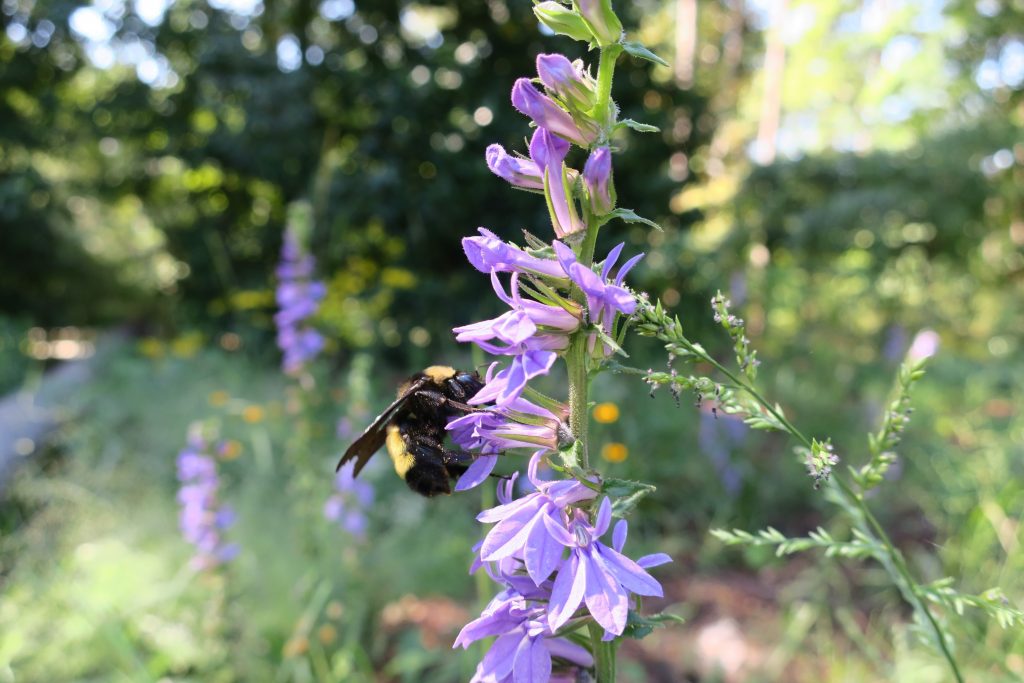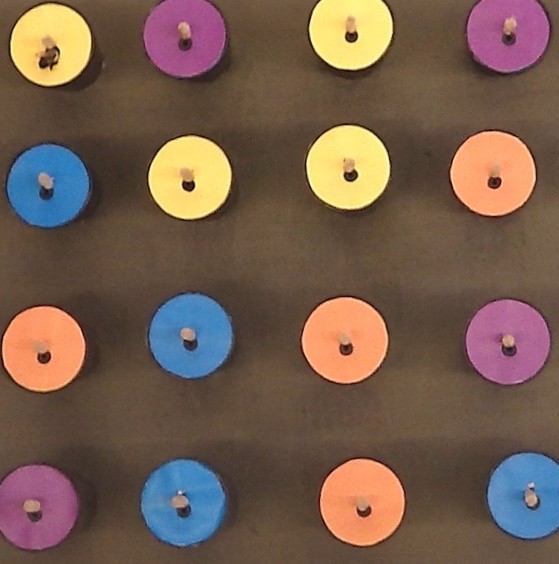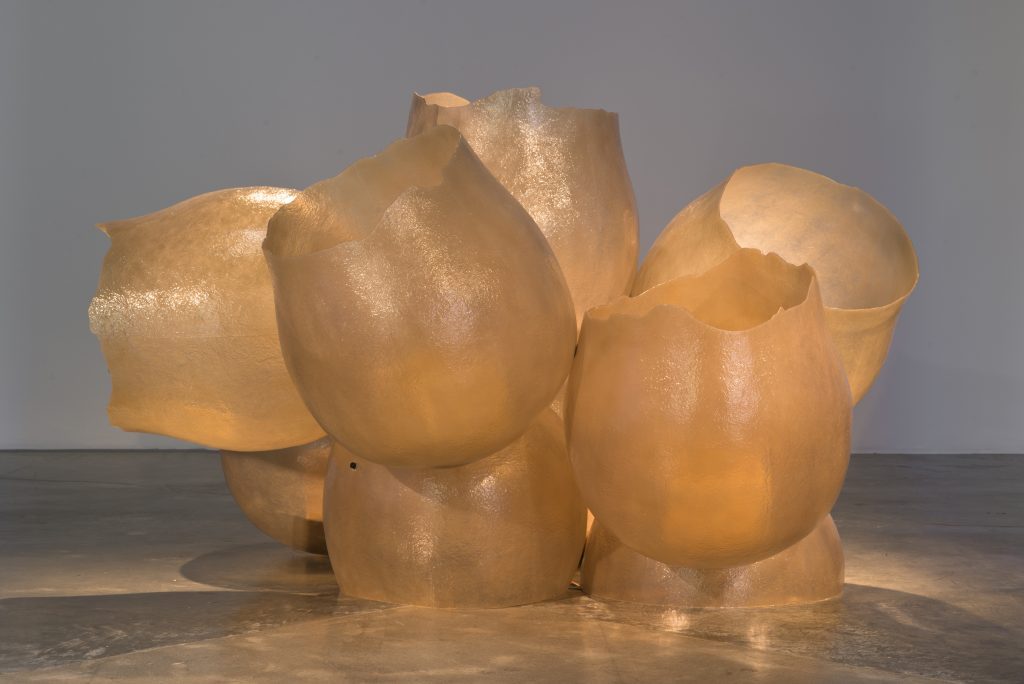The School of Science, Department of Biology, and Center for the Arts at TCNJ are honored to host Dr. Anne S. Leonard of the University of Nevada, Reno for a presentation in our Spring 2017 Arts Brown Bag lecture series.
Dr. Leonard is a behavioral biologist who focuses on the interactions between bees and flowers. She has received national and international recognition for her research as well as awards for her teaching and mentoring. Her work nests at the intersections of science and art and her research influenced A Better Nectar, an art exhibition concurrently on display in the TCNJ Art Gallery from February 1, 2017 until April 9, 2017.
Professor Leonard will showcase her interdisciplinary work in a presentation titled “Exploring the Sensory World of Bees through Science and Art” on Friday, February 3, 2017, from 12:30 – 1:30 pm, in the Mayo Concert Hall.
Lecture – “Exploring the Sensory World of Bees through Science and Art”
- Friday, February 3, 2017
- 12:30 – 1:30 pm
- Mildred & Ernest E. Mayo Concert Hall, Music Building
Presentation Overview
 Over the past 100 years, interactions between bees and the flowers they pollinate have offered scientists a window into a sensory world other than our own. Bees have emerged as an important model system for understanding not only the neural mechanisms involved in learning about floral scents, colors, and patterns, but also how such sensory and cognitive abilities have evolved to cope with the complex informational landscape that underlies a flower-filled meadow. Scientists have mustered an array of approaches to quantify the perceptual world of bees, ranging from the early work of Nobel Laureate Karl von Frisch on color vision, to modern approaches that involve visual modeling of bee “color space”. These discoveries have made it possible for researchers to ask new questions about both the function of common floral signals and the mechanisms of bee decision-making.
Over the past 100 years, interactions between bees and the flowers they pollinate have offered scientists a window into a sensory world other than our own. Bees have emerged as an important model system for understanding not only the neural mechanisms involved in learning about floral scents, colors, and patterns, but also how such sensory and cognitive abilities have evolved to cope with the complex informational landscape that underlies a flower-filled meadow. Scientists have mustered an array of approaches to quantify the perceptual world of bees, ranging from the early work of Nobel Laureate Karl von Frisch on color vision, to modern approaches that involve visual modeling of bee “color space”. These discoveries have made it possible for researchers to ask new questions about both the function of common floral signals and the mechanisms of bee decision-making.
 Building on these research themes, Jessica Rath’s exhibition A Better Nectar offers art as an alternative way to translate the sensory world of bees into human terms. Drawing from the research findings and materials sourced from Anne Leonard’s Lab at the University of Nevada, Reno, Rath began a cross-disciplinary conversation that challenged researchers to view their work on plant-pollinator communication from a shifted perspective.
Building on these research themes, Jessica Rath’s exhibition A Better Nectar offers art as an alternative way to translate the sensory world of bees into human terms. Drawing from the research findings and materials sourced from Anne Leonard’s Lab at the University of Nevada, Reno, Rath began a cross-disciplinary conversation that challenged researchers to view their work on plant-pollinator communication from a shifted perspective.
Understanding how floral signals have evolved to manipulate the behavior of pollinators continues to be a major focus of Leonard’s research; in addition to sharing recent discoveries about how bumblebees learn and remember multi-sensory floral signals, she will also talk about this research’s role as a source of information and inspiration for A Better Nectar.
About Dr. Anne S. Leonard
 Anne Leonard has been an assistant professor in the Department of Biology at the University of Nevada, Reno since 2012.
Anne Leonard has been an assistant professor in the Department of Biology at the University of Nevada, Reno since 2012.
Originally from Berkeley, California, Dr. Leonard began her study of animal behavior while an undergraduate at Brown University. After receiving her PhD from the University of California, Davis, she received a PERT postdoctoral fellowship at the University of Arizona and the Darwin Fellowship to study bee and spider behavior at the University of Massachusetts, Amherst.
In addition to authoring numerous articles in scientific journals, Leonard’s research on interactions between bees and flowers has received coverage in The New York Times, NPR’s “Morning Edition,” Science News, and BBC.com. Supported by a grant from the National Science Foundation, her lab group asks basic questions about communication and coevolution between plants and pollinators and seeks out opportunities to share their research with the public.
Exhibition – “A Better Nectar” by Jessica Rath
- Exhibition Dates: Wednesday, February 1 – Sunday, April 9, 2017
- Opening Artist’s Lecture: Wednesday, February 1, 2017, 4:00-5:00 pm
- Opening Reception: Wednesday, February 1, 2017, 5:00-7:00 pm
- TCNJ Art Gallery

A Better Nectar, by Jessica Rath, is a multisensory installation based on the artist’s extensive research into co-evolutionary communication between flowering plants and their pollinators. The exhibition opens to the public on February 1, 2017 and is on view until April 9, 2017.
In A Better Nectar, Rath creates an immersive experience using sculptural forms, light, and sound to explore how bumblebees learn and remember multisensory floral symbols to find better nectar. Visitors will encounter human-scaled sculptures that evoke a bee’s sensory journey from nest to nectar with audio and visual elements that interpret the bee’s experience of an audibly and visually pulsing world. A Better Nectar is informed by Rath’s research and discussions with the scientists at Leonard Bee Lab at the University of Nevada, Reno.
The exhibition’s highlight, “Resonant Nest,” is a responsive acoustic sculpture taking the form of a human-scaled bumblebee nest. Human voice interpretations of bee communication emanate from the sculpture, designed in collaboration with Ian Schneller of Specimen Products in Chicago. The score, created by Los Angeles-based composer Robert Hoehn and performed by the nationally renowned California State University Long Beach Bob Cole Conservatory of Music Chamber Choir directed by Dr. Jonathan Talberg, will shift with live changes in the local New Jersey weather.
On Friday, February 3, the Art Gallery will have special hours and will be open from 1:30 to 4:00 pm immediately after the Brown Bag Lecture by Dr. Anne Leonard.
For More Information:
- Professor Anne Leonard’s website
- New York Times (Dec. 2016) –”You’re a Bee. This is what it feels like”
- New York Times (Sept. 2016) – “Bees Buzz for their Supper”
- National Geographic (July 2013) – “Bees as Tuning Forks, and Why Your Pizza Depends on Them”
- A Better Nectar exhibition
- Artist Jessica Rath’s website
- TCNJ Art Gallery
- TCNJ Center for the Arts
